New to The Alexandria Project? Find a plot synopsis and guide to the characters here, find the earlier chapters here, and follow the Further Adventures of Frank on Twitter
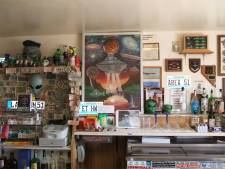 Frank stepped out of the dark, moonless night of the Nevada desert and into the bright light of the bar, restaurant and motel that was the Little A’Le’Inn. Along one wall ran a counter with stools and the backsides of a couple of locals. Behind the counter he saw a waitress, cash register, and a modest assembly of liquor bottles that apparently constituted the bar. That took care of the predictable part of the room. And then there was the rest.
Frank stepped out of the dark, moonless night of the Nevada desert and into the bright light of the bar, restaurant and motel that was the Little A’Le’Inn. Along one wall ran a counter with stools and the backsides of a couple of locals. Behind the counter he saw a waitress, cash register, and a modest assembly of liquor bottles that apparently constituted the bar. That took care of the predictable part of the room. And then there was the rest.
Despite the odd spelling, there couldn’t be much doubt over the meaning of the café’s name. Hung on pegboards, sitting on shelves, and hanging from the ceiling was an impressively random collection of just about anything you might (or might not) imagine could be presented with an extraterrestrial theme.
Frank placed himself on a stool at the end of the counter and glanced at the densely packed array of memorabilia that covered the wall behind the counter – alien posters, alien postcards, alien pens and coffee cups, and dozens of busts of aliens of every shape, configuration and size. That said, most interpreters had reached consensus on two facts: aliens are green, and have large, black slanted eyes. Amid all the clutter was a small mirror, in which Frank noticed the eyes of the man sitting next to him. Those eyes were staring back at Frank intently over the brim of the man’s beer mug.
“Howdy. What’ll it be?”
Frank smiled at the grey haired, matronly waitress, and then looked down at the short menu she slid across the counter.
When in Rome, Frank thought. “How about the Alien burger – medium, with swiss. What’s on tap?”
“Bud, Bud light. In bottles we got Miller, Coors and Corona.”
“Corona sounds right; thanks.”
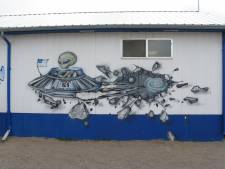 Frank felt out of place. According to the sign his headlights had picked out at the edge of town, Rachel boasted all of 98 inhabitants (when they were all home). That meant about five per cent of the citizenry had decided to have a night on the town. He looked around for something to stare at to feel less like a bump on a log, and spotted Anderson Cooper’s face peering out from a small TV screen on a shelf in the corner of the bar. Even with the sound turned off, that would do.
Frank felt out of place. According to the sign his headlights had picked out at the edge of town, Rachel boasted all of 98 inhabitants (when they were all home). That meant about five per cent of the citizenry had decided to have a night on the town. He looked around for something to stare at to feel less like a bump on a log, and spotted Anderson Cooper’s face peering out from a small TV screen on a shelf in the corner of the bar. Even with the sound turned off, that would do.
A moment later, the camera zoomed in on a monitor behind Cooper. On it, a familiar phrase glowed redly, as if in flames.
Frank sat bolt upright, staring at the message.
“How ‘bout that, eh?” came a voice from beside him.
Frank, eyes still wide in shock, turned to see that the person who had spoken was the man that had been examining him in the mirror. He was old, Frank could see, but he could only guess how old. Clearly, he’d spent many years in the harsh weather of the high desert; his skin was lined and leathery, and his hair and stubbly chin were grey and grizzled.
Frank was still grappling with the implications of the Alexandria Project going public, and simply nodded.
“Bart Thatcher,” his seat mate said. “Pleased to meet you.”
“Carter Columbo,” Frank replied, shaking the hardened hand that had been held out to him. He imagined for a moment that he saw a look of amusement flicker across Thatcher’s eyes when he had offered the still-unfamiliar alias, but concluded the circumstances were making him paranoid.
“Yup. Looks to me like we got ourselves a little problem here. Not that I’m surprised. Been expecting it for awhile now, myself.”
Frank hadn’t listened to the radio on his drive up from Las Vegas, preferring to focus on next steps. Now he was desperate to get back to his truck and find out out what had happened. For the moment, he figured he’d be safer changing the subject.
“What’s with all the little green men?”
Thatcher smiled. “If you don’t know, I guess you’re just passing through. Fact is, that’s the reason most folks from away walk in here. You ever heard of Area 51?” Frank shook his head no.
“Well now. Guess I got to start back aways then. Y’see, just a few miles south of here is this ultra-secret test area for new planes. Some folks would tell you it’s a secret place for a whole lot more, too. The government doesn’t even admit it exists, but you just try and get there. Fact is, you won’t.”
“So how does anyone know about it then?”
 “Oh, that ain’t too difficult. We see stuff from time to time that we’re not supposed to see. Lights that move too fast and go in ways they shouldn’t. Sounds you never heard before. And we know there’s something back behind those mountains you see to the south. Time was when you could hike up to one spot and look down and see all these buildings and runways. Nighttime come, and you could sometimes really catch a show.
“Oh, that ain’t too difficult. We see stuff from time to time that we’re not supposed to see. Lights that move too fast and go in ways they shouldn’t. Sounds you never heard before. And we know there’s something back behind those mountains you see to the south. Time was when you could hike up to one spot and look down and see all these buildings and runways. Nighttime come, and you could sometimes really catch a show.
“Then, back in 1995, the Air Force boys took that spot away from the Bureau of Land Management. Then they moved their surveillance cameras and motion detectors back this side of the ridge, and you couldn’t go there no more. But we all had seen it by then.”
“Not that you really have to go there to see things anyways. Why, one day some kind of jet plane augered straight down into the center of town – pilot punched out just in time, and parachuted in just down the road. In no time, they’d picked him up and Rachel was a-crawling with Air Force folks, contractors and armed guards. By the same time the next day you were lucky to find a stray piece of metal in your yard.”
“It does sound like you’ve got some interesting neighbors. But what does that have to do with aliens?”
“Well, that’s a good question. Maybe you remember the U-2 spy plane? Well, we pretty much know they tested that here, and that takes us back aways, don’t it? The SR-117 Blackbird, too.
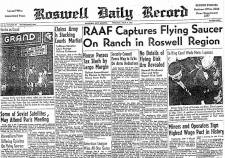 “Then there’s those new radar stealthy planes – the fighter and the bomber that you’ve seen in the news? We seen them years before anyone else did – back before anything that looked like that was supposed to exist. Let me tell you, when you see something like that come whooshing over a rise out of nowhere and pass two hundred feet over your head, it makes an impression you remember.
“Then there’s those new radar stealthy planes – the fighter and the bomber that you’ve seen in the news? We seen them years before anyone else did – back before anything that looked like that was supposed to exist. Let me tell you, when you see something like that come whooshing over a rise out of nowhere and pass two hundred feet over your head, it makes an impression you remember.
“But now let’s say you try and find out what it is you just saw? Who you going to ask? Not the folks at Area 51, because you can’t get in there, and anyway it doesn’t exist. Hard to get a phone number for something that don’t exist, isn’t it? So some folks start to wonder whether it’s really the military that’s there at all. Maybe it’s somebody else. Or maybe it’s both of them. Maybe you heard about the Roswell Incident?”
“That’s the one where people think the government covered up a UFO crash, right?”
“Bingo. Well, some folks think they brought the debris from that crash over here to study in Area 51. Maybe they brought back an alien corpse, too. Maybe they even brought back a live one.”
“You don’t really believe that, do you?”
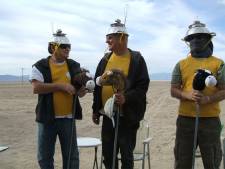 Thatcher chuckled. “Me? No, not me. But enough folks do to keep this place open, and sell a lot of trinkets besides. Yeah, we get some lives ones here, I can tell you. Me, I’m just grateful I don’t have to drive all the way to Vegas to get me a burger. Bad enough I gotta drive 60 miles to get a tank of gas. How you like that burger, anyway?”
Thatcher chuckled. “Me? No, not me. But enough folks do to keep this place open, and sell a lot of trinkets besides. Yeah, we get some lives ones here, I can tell you. Me, I’m just grateful I don’t have to drive all the way to Vegas to get me a burger. Bad enough I gotta drive 60 miles to get a tank of gas. How you like that burger, anyway?”
Frank realized for the first time that it was actually pretty good. Throughout the conversation, he’d been more than distracted, watching the silent TV out of the corner of his eye as the picture switched silently from network to network, each time showing the same sequence: a news anchor speaking; a burning temple; and then the familiar contribution screen. Holy hell – they must have hacked all three networks, and CNN besides. How long could it be before the whole world was after him?
Frank was suddenly anxious to get moving. “Pretty good. Say, I’m looking to spend some time writing – I’ve got a camper outside – and I don’t know Nevada. Where’s a good place to get away from it all and not be bothered?”
Thatcher smiled. “Well, you’re sitt’n there. But if that’s not good enough for you, just about anywhere in Nevada would fill your bill. Over 90% of the land is public – BLM, National Forest, state. Nobody’s living on it but ranchers, and it’s a long piece between them. Other than the couple highways we’ve got, all you’ll find is gravel roads and jeep tracks. I hope you got good tires, and recommend you keep a good eye on ‘em, too.”
Frank the city boy still felt lost. The idea of not having a destination was something he was having a hard time processing.
“Got it. So how about if I wanted to be someplace where I could still drive into a town to get food and gas now and again, but where no one was likely to stumble on me? Someplace that would be a good place to settle in for awhile and just let my mind run? Maybe someplace that looks like this?”
Frank pulled the picture of the boy on his father’s shoulders under the tall trees out of his wallet again, and passed it over.
Thatcher held it in the palm of his hand and gave it a long look. He handed it back to Frank, and then walked across the room and pulled a map off a display by the door. Returning, he spread it on the counter pointed to a small circle two thirds of the way up the state, about sixty miles west of the Utah border.
“This here’s Ely. Closest thing to a landlocked island you’re going to find. More than a hundred miles in any direction to the next town, and not a whole lot when you get there. It don’t amount to much, but it’s got everything you’re going to need.
“Now look here.” Thatcher put an X on a pass on the top of one of the long mountain ridges that striated the map of Nevada. “What you want to do is take this here road out of Ely and follow it till you see a sign that says Petroglyph State Park. You go passed that sign another two miles, and then you look for a dirt road heading north – it’ll have a cattle grate, not a gate – in the fence.” Thatcher wrote the directions on the map.
“You just follow that for as long as you can, and you’ll see you rise up out of the plain and head through pinyon and juniper for a good ways. Ignore the tracks that head off to either side; shouldn’t be hard; they’ll all be more faint. Once you’re up a few thousand feet, the Ponderosa Pines will take over, and that road will dribble out right in the middle of ‘em. You’ll have yourself as fine a view to the west as you’ll want. Nothing to see but forever, and no one to keep you company but the wild horses. There’s a good spring of water there, too. I’ve been there now and again, and I expect it’s just what the doctor ordered.”
“Pat, add this here map onto my tab, and add my friend here’s meal to it, too. Time for me to settle up.”
Frank started to protest, but Thatcher ignored him as the waitress handed him the bill. Thatcher left a few bills on the table, and both he and Frank walked out into the still of the night. Frank couldn’t help but look up, hoping to see something flash mysteriously across the sky. But only the countless stars shone down.
“That your rig?” Frank nodded.
“Well, that there is one piece of work, and no mistake.” Thatcher chuckled. “You best park that contraption out of sight at the edge of Ely and walk yourself into town if you don’t want to be the talk of half of Nevada.”
Frank looked at the truck uncomfortably and realized that Thatcher was right.
“That sounds like good advice. Thanks for that – and for dinner.”
“No problem.” Thatcher looked at him up and down and then held out his hand one more time. “Good luck with that writing,” he said, and then walked around the corner of the bar and out of sight.
– 0000 – 0001 – 0010 – 0011 – 0100 – 0011 – 0010 – 0001 – 0000 –
As instructed, Frank drove away to the north. A full moon began to rise, illuminating the arrow straight gravel road that extended ahead until it disappeared. To either side, the bright light of the moon illuminated the ramparts of the two mountain ridges, twenty miles apart, that bounded the flat valley between. Frank flew down the well-graded road. Soon he felt lost in space and time as he headed for the misty grey notch of the mountains where they converged in the perspective of the distance.
Frank turned on the radio and pressed the search button, first for the FM spectrum, and then the AM. But the numbers cycled endlessly as the radio failed to find a signal strong enough to lock on.
With little to go on, Frank tried to focus on the implications of what he had seen on the TV screen. But try as he might, he was too distracted by something he couldn’t put his finger on as he stared at the moon-washed valley ahead. Finally, he gave up and pulled to the side and killed the engine and the headlights. Immediately the interior of the cab was filled with silence and silvery light, and all inside was transformed into blacks and whites and shades of gray.
For the second time that night, Frank slid the well worn picture out his wallet. He held it in his hand, and watched it come alive in the light of the moon.
– 0000 – 0001 – 0010 – 0011 – 0100 – 0011 – 0010 – 0001 – 0000 –
The most that Frank ever shared about his pre-college past was that he had enjoyed a “storybook childhood.” Then he would change the subject. It was a private joke, and not a very funny one, because while the story was common, it wasn’t the one he would have chosen to live.
The tale began in the early ‘60’s, when Frank Adversego, Sr., a dashingly good looking in his Corporal’s uniform, mustered out of the army and returned to his Queens, New York neighborhood. Fit and tall, with his hair slicked back and a self-confident look on his face, he looked much more interesting than his classmates, all of whom had taken jobs straight out of high school.
This wasn’t, after all, a time and place where first generation kids went to college. It was a get-a-job-and-get-married neighborhood. A job where you helped your immigrant parents sell pizza from a store front or stock shelves in a corner grocery. Or, if you were lucky, you might have an uncle that was a union member who could set you up as an apprentice to a plumber or carpenter. Or maybe you could score really big, and get a job as a fireman – then you’d be set for life, with a pension to follow. Most of Frank’s friends hadn’t been that lucky. The guys all had menial jobs and more than one kid already, and the girls were all those kids’ mothers.
And then there was Doreen Nolan. She was still single, not that she hadn’t had enough offers to join the other team. And Doreen wanted out of the neighborhood in a big way. True, so far she was only a sales clerk in a store, but that store was on Fifth Avenue. Still living at home, she could afford to dress for downtown, too. You could meet the right people that way.
Doreen didn’t feel bound by any other rules, either. Though she lived in the Irish section of the neighborhood, that didn’t stop her from talking to the Italian kid that had left a nobody and came back a handsome soldier with a swagger in his step and a worldly look in his eye. When he asked her out for a date, she said yes.
The next few months passed rapidly. Frank Sr. had saved most of his pay while in the service, and he applied to Fordham University and Hunter College – NYU and Columbia, even – on the GI Bill. They’d told him in the Army that he’d scored off the charts on his IQ test, and Frank had big plans. That gave him and Doreen something in common.
Weekends they lived it up downtown, dancing and taking in the new movies. Doreen posed for Frank as someone more sophisticated than the rest of the neighborhood girls, and Frank posed for Doreen as someone with possibilities. Together they posed for everyone downtown as an attractive young couple with money to spend and time to burn.
Frank even got into NYU and Columbia. But as they sweated through an unusually hot city summer, it began to occur to each of them privately that they didn’t really have much in common besides the desire to feel superior to their high school friends. Worse, Doreen realized that Frank’s idea of family life was a wife that waited on her husband hand and foot, like his mother. And Frank realized that Doreen really did have a mind and plans of her own.
By then, of course, it was too late, because by August they found out they had something else in common: Doreen was pregnant.
 Things happened all too predictably after that. Of course, there was a wedding in the neighborhood Catholic church followed by a reception in a VFW hall. And instead of a ticket out of Queens for Doreen, there was a walk-up apartment down the street from the one where she had grown up. They tried to put up a good front, but now there wasn’t anything to back it up.
Things happened all too predictably after that. Of course, there was a wedding in the neighborhood Catholic church followed by a reception in a VFW hall. And instead of a ticket out of Queens for Doreen, there was a walk-up apartment down the street from the one where she had grown up. They tried to put up a good front, but now there wasn’t anything to back it up.
With rent to pay, Frank gave up his hopes for college and found a job as a mechanic in a garage where a cousin worked. As a kid, Frank was always tinkering, and in the Army he’d trained as a mechanic. What he couldn’t get to work was barely worth scrap, so it didn’t take too long for his boss to notice. He got his first raise within months.
That didn’t help much on the home front, though. Back then, nobody wanted to see a pregnant woman behind a counter in a fancy store – or really, much of any place else, either. So not long after they were married, Doreen had to give Manhattan up. Now there was nothing to do but sit around the cramped apartment, staring out the window at the drab streets she had so much wanted to leave behind. Or she could visit with her sisters, sitting with their crying babies in their cramped apartments. No Saturday nights out now, either. Not with a baby to save for.
When Frank Jr. arrived, things were already tense. Maybe they could have found a way to share their disappointments and move on, but Frank wasn’t a talker, and Doreen wasn’t about to stand in for his mother when he came home from work. So it was easier to find fault and bicker, with both feeling cheated and stuck. By the time Frank Jr. turned one, Frank Sr. was staying out late, taking night school classes or having a few down the street with the boys from work. On weekends, when Frank wasn’t cramming for school, Doreen was likely to be at her mother’s with the baby. That was better than the other alternatives, which now seemed to have narrowed down to silence and yelling.
It was the sort of marriage you could have found behind a dozen other sets of curtained on the same street in Queens, or indeed on any street in any of the other Five Boroughs for that matter. But, oh my, they sometimes thought to themselves. It had all happened so fast. No surprise then that Frank Jr. remained an only child.
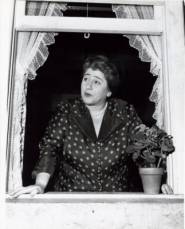 He well remembered the first time he realized that some of his friends came from a different sort of home. It was always a shock when he saw the mother of a friend give her husband a kiss when he came home from work. What was that all about? From then on, he watched his friends’ families more closely. He became painfully aware of signs of affection, not only between the parents of his friends, but between his friends and their sisters and brothers as well. Life at home seemed colder than ever.
He well remembered the first time he realized that some of his friends came from a different sort of home. It was always a shock when he saw the mother of a friend give her husband a kiss when he came home from work. What was that all about? From then on, he watched his friends’ families more closely. He became painfully aware of signs of affection, not only between the parents of his friends, but between his friends and their sisters and brothers as well. Life at home seemed colder than ever.
Year’s later, reading a news story about the Balkan war, Frank realized he had been like some sort of ineffectual U.N. peacekeeper, sent to a God forsaken hole where he wasn’t wanted and was barely tolerated, lacking the authority to make a difference but representing a target of opportunity. All he could do was watch while the locals undermined each other in the light of day, and garroted each other in the dark of night. Neither of his parents took any prisoners – except Frank.
The time honored solution would have been to have found a life of stickball and running around in the streets. Sadly, Frank found that while he was bright, he was anything but athletic. He hated being the last to be picked when choosing up sides for games, so by default school and a few interested teachers became his world of choice. Joining the chess club and math team, of course, branded him with indelible nerdhood in his classmates’ eyes, so he flaunted his prowess in math and science class. It didn’t endear himself to anyone, but on the other hand, no one was going out of their way to be endeared by him, anyway.
And it did make him feel superior – in his own eyes, at least. Moreover, he didn’t have to be a real genius to realize that the best way to get the hell out of home and school was to skip as many grades as he could, get a college scholarship, and leave Queens for good. He owed that conclusion, anyway, to his mother.
That might have been the whole story. But unfortunately it wasn’t. Frank never knew what it was that had finally tipped the balance between his parents, but one day he came home from a boy scout jamboree to find his mother sitting in a darkening living room, her hands in her lap and her eyes gazing out the window.
“Hi Mom,” he called from the kitchen. “Where’s Dad?”
She didn’t anwer, so after tossing his pack on a chair he stepped into the living room.
“Mom?”
His mother still sat there, lost in thought. Frank felt suddenly frightened by her furrowed face, half hidden in shadow and half dimly illuminated by the fading light penetrating the old-fashioned lace curtains in the window. His mother seemed to be balancing a question of great weight, her head nodding slightly, sometimes back and forth, and sometimes up and down.
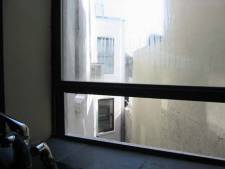 Frank felt torn between the need to hear her speak and a sudden fear of what she might say. And then her brow relaxed. A look of quiet peace, and perhaps triumph, spread across the ghostly half of her face he could still see.
Frank felt torn between the need to hear her speak and a sudden fear of what she might say. And then her brow relaxed. A look of quiet peace, and perhaps triumph, spread across the ghostly half of her face he could still see.
“Mom?”
His mother turned on the table lamp at her elbow, then, and looked at him.
“Frank,” she said in a serene voice, “Your father is gone.”
For the rest of his life, Frank wondered whether he had imagined, or whether she had really added the words, “at last.”
Carl can’t follow Frank on the run, but you can, on 
Email this chapter to a friend
Email the first chapter to a friend
Read the next chapter
Read the `last chapter
Read the first chapter